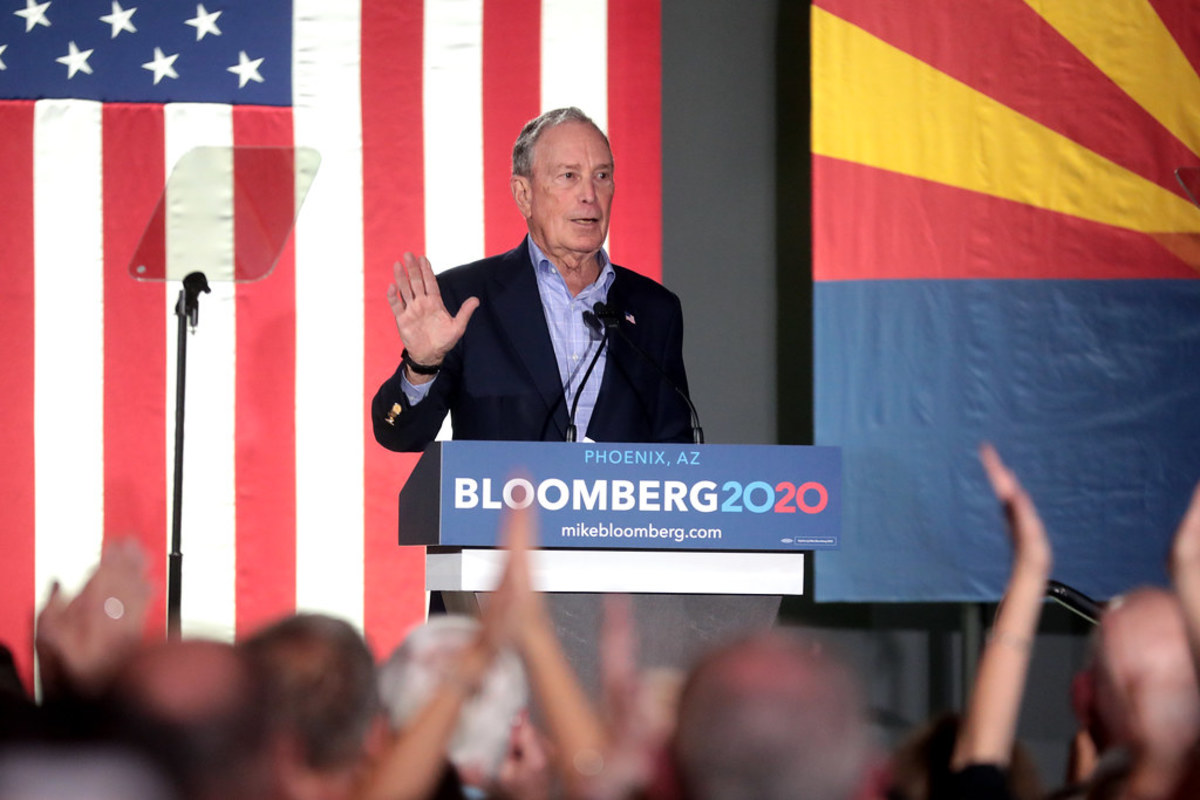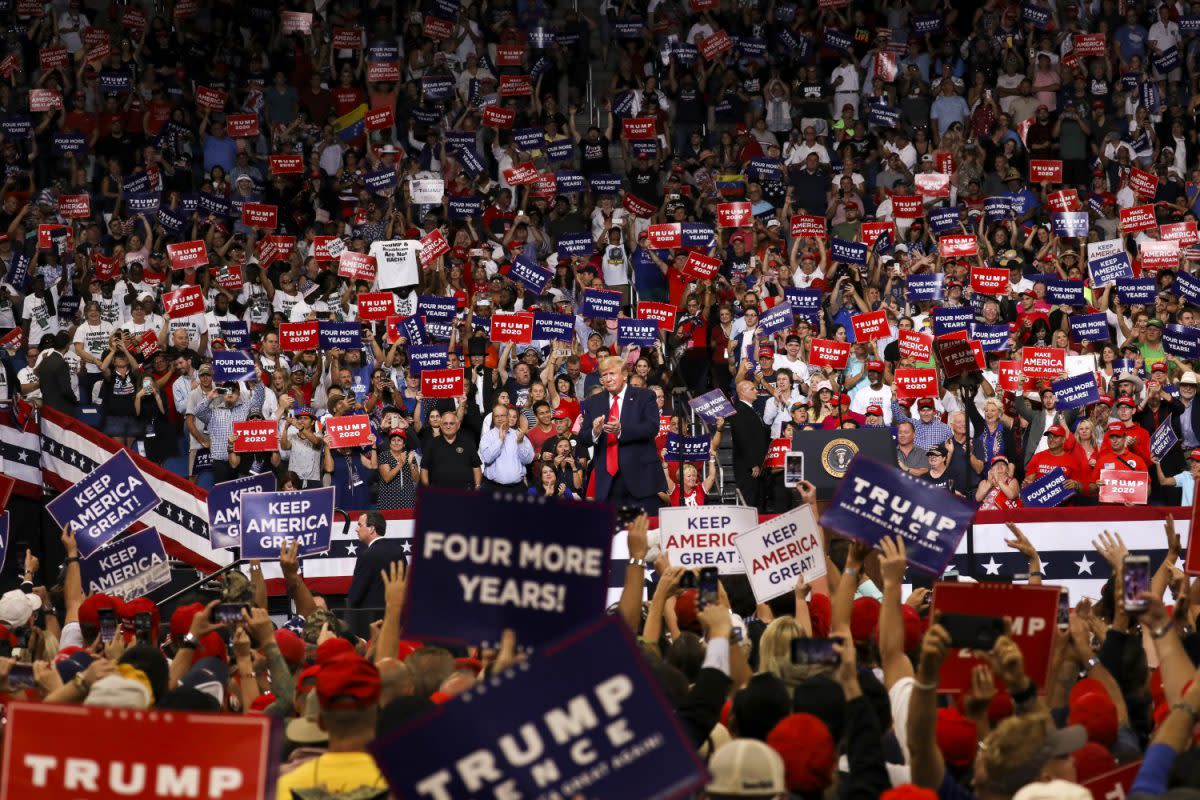Michael Bloomberg's Effect on the 2020 Election

Who Is Michael Bloomberg?
Michael Bloomberg is a billionaire with a net worth of around 62.8 billion dollars.1 This is six to twenty times President Trump's net worth (a figure which is not known, though estimates vary wildly, particularly if we include Trump's claims). Bloomberg has been a Democrat, a Republican, an independent, and re-registered as a Democrat in 2018. He served as the Mayor of New York City from January 1, 2002, until December 31, 2013.2 He is also the owner of a media website called Bloomberg. He is a successful businessman, author, and an on-and-off politician.
Michael Bloomberg's 2020 Presidential Campaign
Bloomberg initially decided not to run for president; he was hoping Joe Biden would become the Democratic nominee and would go on to defeat President Donald Trump. These hopes, however, were not seeming to materialize. Thus, Bloomberg entered into the 2020 election as a Democratic candidate late and missed the Iowa caucus and the New Hampshire primary. He will also miss the Nevada caucus and South Carolina primary.
When Bloomberg entered the race, he immediately put his vast fortune to work. He has, so far, spent $350 million on his presidential campaign. He has not been accepting donations and has instead chosen to self-fund his campaign. He is skipping the first four state elections and is instead focusing on Super Tuesday states. This seems to be paying off because he is rising in the national polls and he is currently leading in polls for the Florida primary.3
Bloomberg is running as a successful businessman and politician that not only wants to unseat President Trump, but as a man who also has a personal disdain for Trump. He and Trump both have primary residences in New York City, and they have both had a lot of dealings with each other over the years. In fact, they used to be friends, but now, it is all-out political war between these two.
Bloomberg Is the Most Capable of Beating Trump
Bloomberg is self-funding his campaign, and he is willing to spend as much as it takes to unseat Trump as President. Trump has been raising money for his reelection campaign since he entered into office on January 20, 2017. Trump started his reelection campaign the day that he entered into office. He has been campaigning for reelection since the very beginning of his presidency. As a result, Trump is enjoying a massive head start against his Democratic rivals. Michael Bloomberg is the only one who is capable of closing the spending gap because of his massive net worth.
Bloomberg has also proven to be effective in playing Trump's cards, so to speak. Most politicians don't know how to handle Trump's abrasive attitude, but Bloomberg seems to be able to take it and dish it.
Bloomberg also has traits that make it hard for Trump to classify him as incompetent. For example, Bloomberg is substantially richer than Trump. Bloomberg has been successful in many business ventures, and he was a very popular mayor in New York City. Bloomberg is also moderate, so it would be difficult for Trump to run his socialist label if Bloomberg were to become the Democratic nominee.
Obstacles to a Bloomberg Presidency
Of course, Bloomberg has not won the Democratic nomination, and with Bernie Sanders surging as the new front runner, the Democratic party is faced with a potentially disastrous situation. Bloomberg is a billionaire, and many of the Democratic candidates and their voters have spoken negatively about the billionaire class. Many Democrat voters that have a negative attitude of billionaires have been supporting Elizabeth Warren and Bernie Sanders. Not to mention, Bloomberg has said many controversial things and has supported controversial policies such as "stop and frisk," and even said he favored singling out black neighborhoods because "that is where the crime is."
At this point, the only two candidates that have a realistic shot of becoming the Democratic nominee are Bernie Sanders and Michael Bloomberg (Pete Buttigieg has, at best, a long-shot chance). These two are about as opposite as you can get. Sanders, a millionaire himself thanks to his successful books (it's ironic that capitalism made a socialist rich, isn't it?), has repeatedly talked badly about the rich, and in particular, the billionaire class. Michael Bloomberg represents everything that the type of person who would be a die-hard Sanders supporter would hate. If Bloomberg wins and he is endorsed by Sanders and Warren, who have both pledged to support whoever wins, that will not go over well with Sanders' and Warren's voters.
Sanders, at this point, is the presumptive front runner. Pete Buttigieg. although he is ahead of Sanders by one delegate, has not seen much traction nationally after his Iowa caucus victory, which was eclipsed by Sanders winning the popular vote, and Buttigieg's coalition is not broad enough for his bid for the Democratic nomination to be realistic. Michael Bloomberg, on the other hand, has shown significant traction nationally. While it is improbable that he can obtain enough delegates to win the Democratic nomination outright, he would have a realistic chance of winning the nomination in a brokered convention, if it were to occur.
A Bitter Loss on the Horizon for Democrats
The Democrat Party faces an uncomfortable situation. It is clear that Bloomberg and Sanders are the most likely candidates to secure the nomination.
If Sanders wins, the Democrat party will be labeled 'The Socialist Party;' they will certainly lose to Trump, and they may even lose the House of Representatives because moderate Democrats would be vulnerable due to the party's leftward shift. Sanders would have an energetic campaign, but his coalition would not be broad enough because independents, who are usually moderate, are unlikely to vote for him. Many swing states would not be in play for Sanders due to him being a socialist. Florida, Ohio, North Carolina, Arizona, would all be out of play for Sanders.
This would bring the election down to the rust belt states. Trump would only have to win one rust belt state to secure the election (thanks to Nebraska and Maine's split electoral districts). Given that Trump beat Hilary Clinton in 2016, and now, Trump enjoys the incumbent advantage, superior organization in the Republican National Convention, and a very well organized campaign of his own, winning at least one of these Rustbelt states would not be a difficult task for Trump. I'd expect to see a match up against Bernie Sanders resulting in Trump getting north of 300 electoral votes.
On the other hand, if Bloomberg wins the nomination, Democrat voters have to come to grips with potentially supporting a candidate that represents everything that the progressive candidates preached against. If Bloomberg wins, he would likely not have the support of many Sanders voters, and thus he, too, would lose against President Trump (although he would be a tougher opponent than Sanders, at least, when it comes to polling—whether or not voters would turn out for Bloomberg is a different matter entirely).
Unlike Sanders, Bloomberg would be competitive in Florida and maybe in North Carolina, but he would be weaker in the rust belt states than Sanders (with the exception of Pennsylvania). Trump would certainly be able to get north of 270 electoral votes against Bloomberg, and perhaps, he would be north of 300 votes. Bloomberg, unlike Sanders, does not generate a lot of excitement so it is possible that, like Biden, Bloomberg's voter turnout underperforms his polling. Crowd size is a measure of energy, and Bloomberg's crowds are dwarfed by the size of both Sanders' and Trump's crowds.
Either way, it is certain that the Democratic party is heading toward a defeat in 2020. Trump's base is energized and he has almost every Republican's support. Even though Trump is facing no serious challenger in the Republican party, he has had record turnouts for the Republican primary elections so far. Trump is also an expert marketer so he knows how to effectively brand his opponents to his advantage. In contrast, there is now, with Bloomberg's entrance into the race and Sanders being the new Democrat front runner, no realistic scenario where the Democrats will be able to defeat President Trump. The Republican party is energized and the Democrat party is divided, and it will likely be divided even after the Democrat Party selects a nominee.
Footnotes
© 2020 Jason L Petersen







![American Politics: The BIG LIE in Politics, From The Republican Presidential Convention [124] American Politics: The BIG LIE in Politics, From The Republican Presidential Convention [124]](https://images.saymedia-content.com/.image/t_share/MTc2NDYyMjI1MzEyNjU1MzIy/the-big-lie-in-politics-from-the-conservative-side.jpg)
